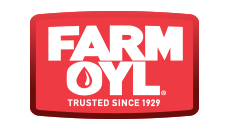Aluminum Complex Grease
Has good high temperature characteristics, with a dropping point approximately 500°F, excellent water tolerance, good shear stability, and responds very well to additive treatments that enhance performance capabilities, such as oxidation and rust inhibition. Frequently used in lubricating food machinery.
Bentone (Clay) Grease
Bentonite clay is treated with a polar activator that will give an electrical charge to the clay particles, thus aligning them to hold the lubricating oil in suspension in a non-soap thickened, grease structure. Not very compatible with other greases, since the electrical charge may be destroyed and soften the grease beyond performance limits. This type of product is often called a No-Melt grease. Has good water resistance, low temperature pumpability and extremely high temperature applications where a non-melting grease is required, the clay structure can aid in setting up a self-forming oil seal where bearing seals are impossible to maintain such as in wheel bearings on high temperature kiln cars.
Calcium Grease
Among one of the first types of grease manufactured. Used today largely because they are moderately priced. Manufactured by using hydrated lime and a fatty material. Calcium grease must be used in a lower temperature environment, since they are limited to approximately 150°F. Higher temperatures may alter the grease structure. Has very good water tolerance.
Lithium (12-Hydroxy Stearate) Grease
A multi-purpose type grease with a buttery texture and dropping point above 350°F. Can be used with occasional temperatures up to 300°F. Lithium grease has excellent resistance to water and breakdown, or softening, by working. Pumpability is a very strong characteristic for this type of grease. The term Multi-Purpose Grease is used because they combine, in a single product, desirable characteristics normally found in each of several products. Almost 60% of the total grease market is satisfied by this type of grease.
Lithium Complex Grease
A newer type of grease, showing many of the same characteristics as the simple lithium greases, with improved performance in the area of high
temperature, high speed bearing life. Dropping point is approximately 500°F.
Polyurea Grease
A grease of fairly recent development that does not use a conventional soap thickener. This type of grease has a high dropping point, approximately 470°F,
has an ashless structure, excellent water resistance, pumpability and provides superb high temperature bearing life. Often used in electric motors, alternators and in food machinery. Some Polyurea greases
are very shear sensitive, that is, they will soften in dispensing and harden in the bearings. Lighter consistency greases may give better performance under these conditions.
Sodium Grease (Soda Soap)
Generally a fibrous textured, stringy grease, that was used as a standard wheel bearing grease for many years. Dropping points will vary between 300 – 400°F, and have good shear stability. A low-cost grease that has good rust protection, but very poor water resistance.
Grease Compatibility
When two greases are mixed, the resultant mixture often exhibits properties and performance
characteristics that are markedly inferior to those of either grease by itself. Therefore, it is wise to exercise caution in switching between types of grease that may have compatibility problems. The system should be cleaned of all previous grease when making a switch between grease types. If it is impossible to remove previous grease type from the bearings, grease more frequently until all traces of previous grease have been flushed out of the bearing.
It is our recommendation not to mix greases with different families of thickeners. For example, ML 365 (lithium – 12 hydroxy soap) should not be mixed with ALUBEN (aluminum complex soap).
 Menu
Close
Menu
Close